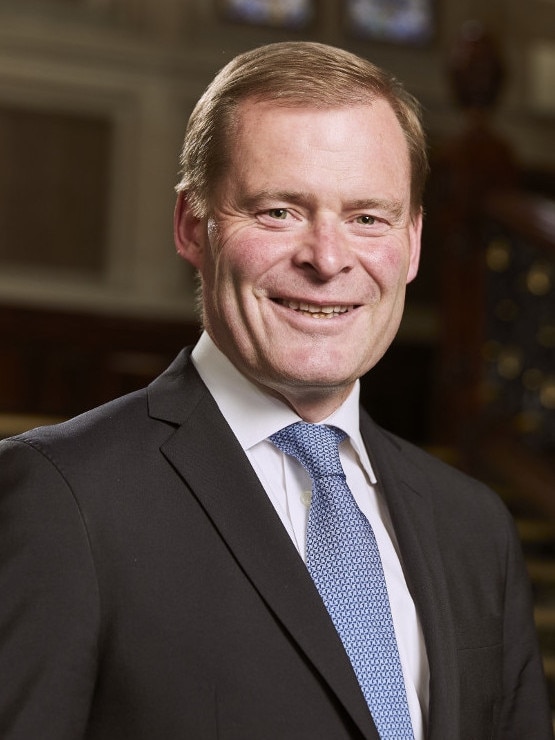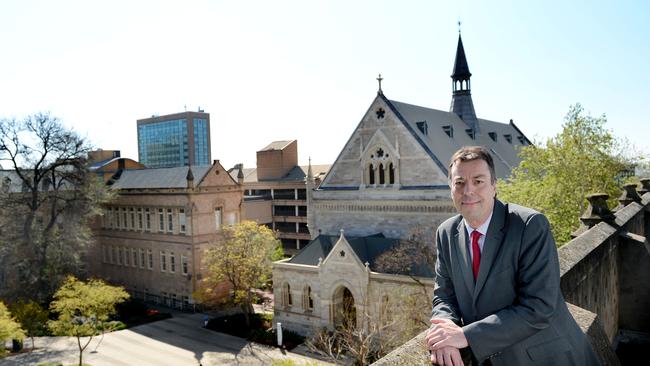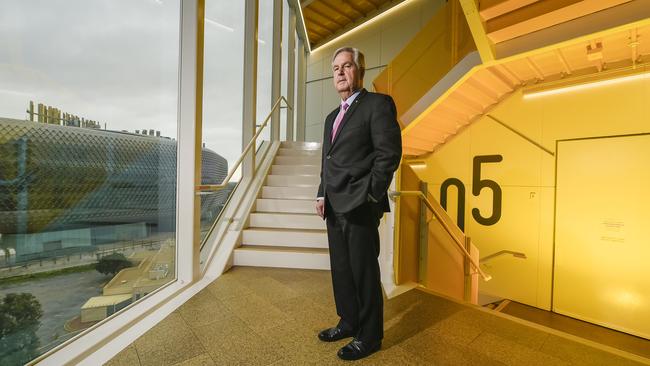Kevin Scarce quits as Adelaide Uni chancellor six months early – then vice-chancellor Peter Rathjen takes indefinite leave
The University of Adelaide has broken its silence on the sudden departure of its top two leaders, as the mystery deepens over why they left.

Tertiary
Don't miss out on the headlines from Tertiary. Followed categories will be added to My News.
- Adelaide Uni senior team donate fifth of their salary to student coronavirus relief
- 2018: Adelaide Uni, UniSA dump merger talks
- Rathjen’s radical plan for six-month degrees
- How to get the most from your Advertiser digital subscription
Adelaide University says arguments over finances were not the cause of the departure and indefinite leave of its two top leaders — Chancellor Kevin Scarce and Vice-Chancellor Peter Rathjen.
With staff, students, alumni and the public shocked by the sudden moves, the university has said it cannot reveal reasons for the absences.
“The recent announcements are not in any way related to the financial health of the university or the impacts of COVID-19,” a spokesman said.
“The university, like many institutions, is facing a budget shortfall due to COVID-19, but is in a sound financial position and is expecting a strong recovery after the pandemic has ended. “There is no risk of the university becoming insolvent.
“There is no suggestion of financial impropriety.
“The university is not in a position to comment further.”
The rejection follows reports in The Australian and Times Higher Education of a feud over finances at a special meeting of the governing council meeting this week.
Premier Steven Marshall said even the State Government was not fully in the picture.
“We haven’t had an update on what’s happening at Adelaide Uni,” Mr Marshall said today.
“That might make itself clearer over the course of the day.”

Mr Marshall said he had spoken to acting vice-chancellor Mike Brooks to offer support.
“We’ve got a lot of work we’ve got to do with the university sector in South Australia and how we respond to the COVID-19 crisis,” he said.
Mr Marshall said international students were SA’s biggest export earner and his Government was in discussion for a pilot project to bring in overseas students via a quarantine stop in Adelaide hotels, similar to the recently completed repatriation of Australian citizens and residents from India.
Federal Trade, Tourism and Investment Minister Simon Birmingham said Adelaide University was an “esteemed institution and an important part of our economy”.
The Federal Government, as a major funder of the university, would engage with it as necessary but he had faith in the interim leadership of Professor Brooks and acting Chancellor Catherine Branson “with whatever circumstances they face”.

The most recent published financial report from the University of Adelaide shows it earned $224.5 million in 2018 from international students, or 24 per cent of its operating revenue.
Roughly a third of Adelaide’s 21,000 students are from overseas and research students at masters and PhD level are “predominantly” from overseas.
A Centre for Independent Studies report last August said Adelaide “may have a ‘China problem’ lurking in fiscal over-reliance on Chinese international students”.
The announcement on Professor Rathjen was made by Professor Brooks, who emailed staff on Tuesday morning to say the university’s council had accepted Professor Rathjen’s special leave “for an indefinite period”.
It came less than a day after the university’s chancellor announced his sudden resignation.
“Council has asked me to assume the position of acting vice-chancellor during this time,” Professor Brooks wrote.
The lack of clarity on Professor Rathjen has allowed for widespread speculation.
The interstate and international reports blamed council feuding over a financial rescue plan but ABC radio commentators pointed to unspecified legal reasons.
Former deputy vice-chancellor Pascale Quester also left her post earlier this year to become Swinburne University’s vice-chancellor.
On Monday, Rear Admiral Scarce quit the post six months earlier than planned, telling the institution’s council his resignation was effective immediately.
In a statement to The Advertiser, National Tertiary Education Union SA branch president Nick Warner said his organisation did not know why the chancellor and vice-chancellor had left.
He said the changes had “come as a shock to staff” and the lack of explanation had added to “anxiety levels already heightened by the COVID-19 crisis”.

“University of Adelaide staff desperately need clarity from the University Council and the remaining Senior Management on why the Chancellor has resigned and why the Vice-Chancellor is taking indefinite leave,” Mr Warner said.
Rear Admiral Scarce has been the university’s chancellor since December 2014 and was reappointed for a third term in 2018. That term was due to expire in November.
In a press release announcing his departure, no reason was given as to why he was leaving. He celebrated his 68th birthday this week.
However, deputy chancellor Catherine Branson thanked the former SA governor for his contribution.
“As chancellor, he has led council during an important time of transition, when the University’s world rankings and its role in the South Australian community have continued to rise,’’ Ms Branson said.
A merger between Adelaide University and UniSA was investigated in 2018 under the leadership of Rear Admiral Scarce and Professor Rathjen, however, the two universities were unable to broker a deal.

Rear Admiral Scarce was born in Woomera and grew up in Elizabeth before joining the Royal Australian Navy as a 15-year-old.
He enjoyed a stellar naval career, reaching the rank of Rear Admiral and ended up running the Defence Materiel Organisation, an organisation responsible for buying billions of dollars of military equipment.
Mr Scarce returned to Adelaide to run the state’s bid to win the $6 billion air warfare destroyer program.
After that success he became state governor in 2007, holding the post until 2014.
The former rear admiral also presided over the Weatherill government’s controversial Royal Commission into the Nuclear Fuel Cycle, which examined whether the state should become more heavily involved in nuclear fuel or waste storage.
Rear Admiral Scarce and Professor Rathjen were contacted for comment over their decisions.
